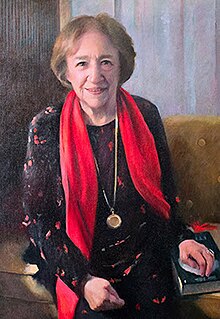American poetry critic (1933–2024)
Helen Vendler
Born Helen Hennessy
(1933-04-30 ) April 30, 1933Died April 23, 2024(2024-04-23) (aged 90) Occupation Professor Spouse
Zeno Vendler
(
m. 1960;
div. 1963)
Children 1 Awards Fulbright Scholarship, 1954
James Russell Lowell Prize of the Modern Language Association (MLA), 1969
American Council of Learned Societies Fellowship, 1970
Metcalf Cup & Prize, Boston University, 1975
National Book Critics Circle Award for Criticism , 1980
Truman Capote Award for Literary Criticism , Iowa Writers' Workshop , at the University of Iowa , 1996
Charles Homer Haskins Lecture, American Council of Learned Societies , 2001
Jefferson Lecture in the Humanities, National Endowment for the Humanities , 2004
Don M. Randel Award for Humanistic Studies, American Academy of Arts and Sciences , 2013
Gold Medal for Belles Lettres and Criticism from the American Academy of Arts and Letters , 2023 Alma mater Emmanuel College (AB )Harvard University (PhD )Discipline English Sub-discipline Poetics Institutions Harvard University Boston University Cornell University Swarthmore College Smith College Main interests Emily Dickinson , George Herbert , John Keats , Seamus Heaney , Wallace Stevens , W. B. Yeats , William Shakespeare
Helen Vendler (née Hennessy ; April 30, 1933 – April 23, 2024) was an American academic, writer and literary critic. She was a professor of English language and history at Boston University , Cornell , Harvard , and other universities. Her academic focus was critical analysis of poetry and she studied poets from Shakespeare and George Herbert to modern poets such as Wallace Stevens and Seamus Heaney . Her technique was close reading , which she described as "reading from the point of view of a writer".[ 1]
Vendler reviewed poetry regularly for periodicals including The New Yorker The New York Review of Books National Book Award and Pulitzer Prize and so was influential in determining writers' reputation and success.[ 1]
^ a b Cite error: The named reference NYT was invoked but never defined (see the help page ). 